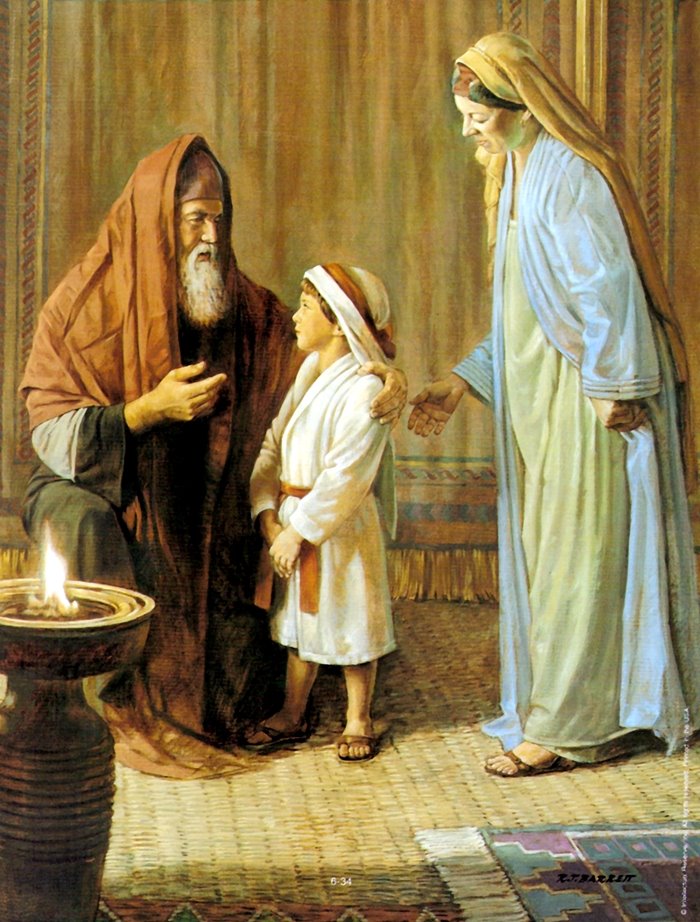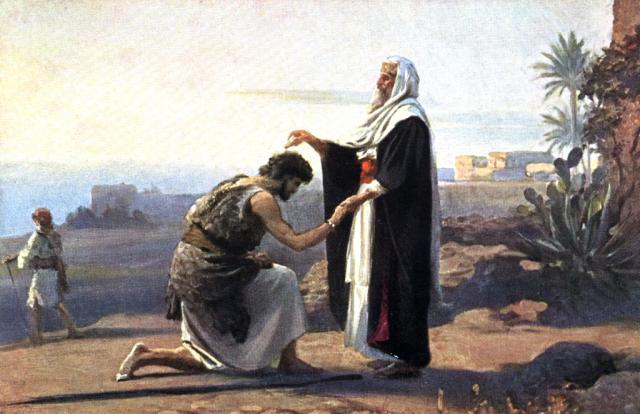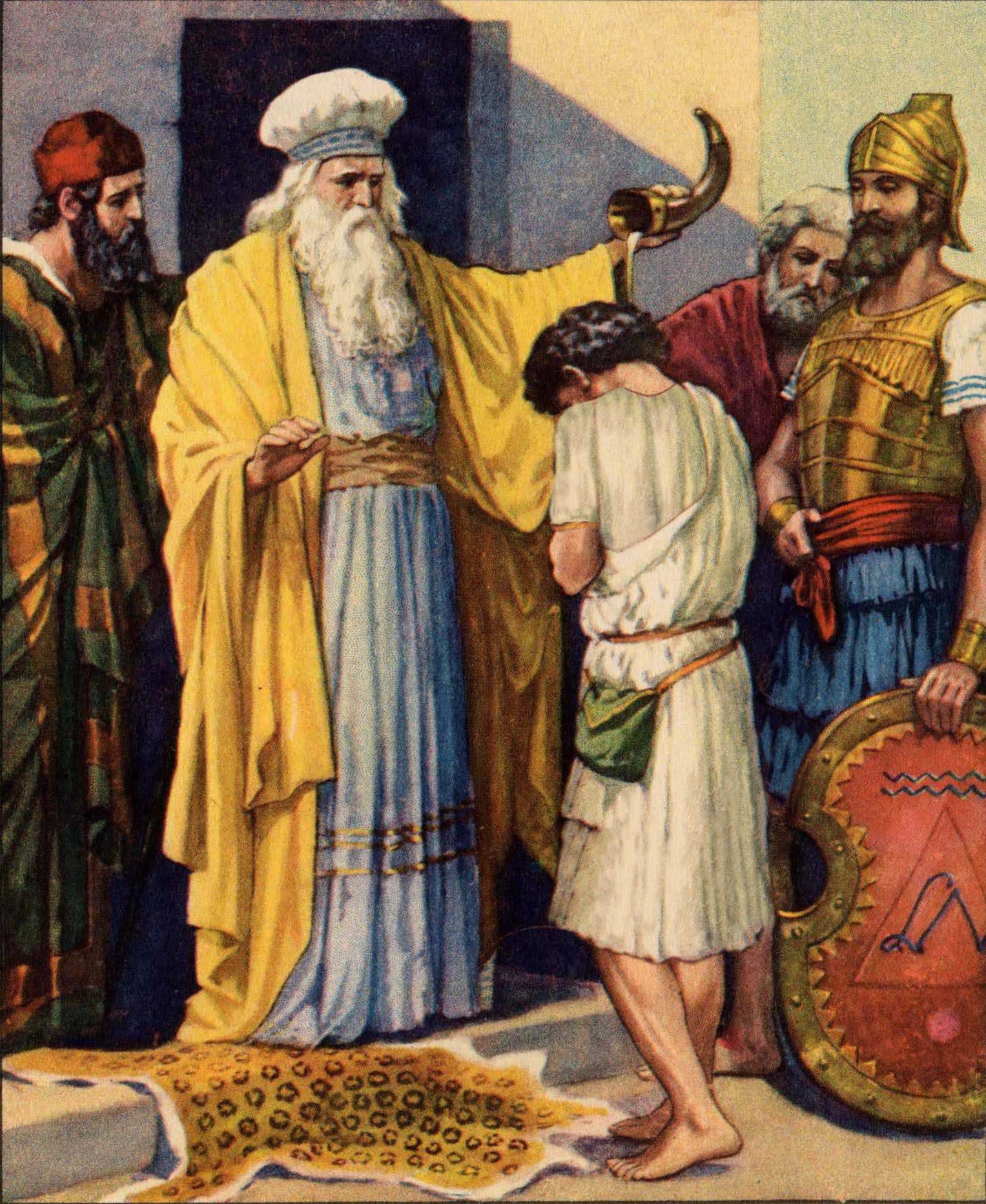

From 'Old Testament Prophets: Samuel'
Anotated by Don R. Hender | |

“The experience of the boy Samuel, as he responded to the Lord’s call, has ever been an inspiration to me.”1 —President Thomas S. Monson[" . . . Samuel answered, Speak; for thy servant heareth. And the LORD said - Behold, I will do a thing in Israel, at which both the ears of every one that heareth it shall tingle." ~ 1 Samuel 3:10-11] |
Samuel was a Levite as the record of 1 Chronicles 6:16-28 atests. And as the first verse of I Samuel reports, his father Elkanah resided at Ramathaim-zophim, of Mount Ephraim. That is he was a Levite who had been assigned to minister and serve in and to the tribe of Ephraim. Therefore he by that association was considered an Ephraimite himself by social and community association and was therefore reported in the Biblical record as being an Ephrathite, that is an Ephraimite, meaning one of the tribe of Ephraim. (1 Samuel 1:1) |
[This Section Is Given As if Samuel Is Narrating His Story]My mother, Hannah, was barren and prayed at the temple for a son, vowing to give him to the Lord. God answered her prayers; she gave birth to me. While I was still young, she brought me to the temple to serve Him. There the priest Eli cared for and taught me.2 As a child, I heard a voice calling my name one night. Three times I went to Eli, but he had not called me. He said it was the Lord calling me. I followed Eli’s counsel when I heard my name the fourth time and answered, “Speak; for thy servant heareth.”3 The Lord spoke to me, and as I grew older, He was with me. He called me to be His prophet. When I grew old, I appointed my sons as judges over Israel. My sons were unrighteous, so the elders of Israel asked for a king. I warned the people of the dangers of having a king, but they persisted in their pleas. The Lord commanded that I should “hearken unto their voice.”4
 The Lord sent me Saul—“a choice young man”5—and I anointed him as “captain over [the] people Israel.”6 He became their king. However, when the Lord commanded Saul to destroy the Amalekites and all they had, he disobeyed. He kept the Amalekites’ animals and offered them as sacrifices. I taught Saul that “to obey is better than sacrifice, and to hearken than the fat of rams.”7 Due to Saul’s disobedience, the Lord commanded me to anoint a new king from among the sons of Jesse. Jesse presented his seven oldest sons to me, but the Lord had not chosen them.8 The Lord revealed to me that the youngest son, David, should be the king. By countenance or stature, David’s older brothers may have looked more like future kings, but the Lord had chosen this young shepherd boy to lead His people. From this experience I learned that “the Lord seeth not as man seeth; for man looketh on the outward appearance, but the Lord looketh on the heart.”9 As the Lord's prophet and the administrating priesthood authority through my Levite family's assignment to minister to the tribe of Ephraim, perhaps the most significant ordaining and anointing priesthood act, which I did administrate in was that anointing of the young lad David. For in him was the covenant preserved and my administrating office fulfilled. I had performed the earthly ordaining of the heir of the covenant, David, as the then righteous son of Jesse that Ephrathite son of Obed. And Obed was that son raised up unto the dead, that is the family of the covenant of Elimelech and Mahlon his son, Ephrathites of the linage of Joshua and Nun before them. And before them such as Ephraim, Joseph, Jacob, Isaac and Abraham in and by whom the covenant remained in the earth to the bring forth the 'seed', that is the Saviour and Redeemer of the world. And if having done nothing more but this one act, my office would have been fulfilled and given me before the foundation of the earth.
|
Preserver of the Biblical Record
Though Israel had abandoned their relationship to their God, that is the recognition of God as their King; God had not abandoned Israel. The first two kings of Israel was selected by God by the hand of God's prophet Samuel. And God had even inlaid the decent of the covenant heir in the Royalty of Israel when it was David son of Jesse son of Obed the son who was the seed of the dead family of Elimelech and Mahlon, the Ephraimite heirs to the birthright covenant and the Covenant of the Promised 'Seed' in Abraham. And thus, after that time in which Isreal had rejected God to be their king, two righteous youths were selected to be Israel's kings by God through Samuel. First Saul and then David the covenant heir. And the Prophet Samuel was their advisor, and as long as the young kings followed the councel of Samuel all was well in Israel as God was still a voice in the leadership of His people. But both, first Saul and then even David in his sins, did turn from God and found themselves outside of God's directive shield of directing the kings of Israel. And so it would run in the Royal house of Israel. Some kings would walk in the ways of the Lord, following the councel of the prophets God would install to so guide them if they would harken unto God's word. But the 'seed' was made sure and heir to the Kingdom of Israel, and would eventually come to fulfillment when and in Jesus Christ as the heir of the Kingdom of David and also the Covenanted promises and blessings of the birthright blessings of Abraham. |
|
[Fact Box: Samuel]
|
'David' meaning 'Beloved' is, was and will be that name of our Lord God, as he is addressed
by his LORD, God the Father, Elohim. And even so do the scriptures so read that in the latter
end of the ushering in of that Great Millennial day will our then new King David arise to
reign for a thousand years. That is the Lord Jesus Christ, who is the same as Jehovah, will
openly take upon himself that name of his own which is David, being the 'Beloved' Son of the
Fahter, by whom the course of redemption is run and the Plan of God fulfilled in its workd
and its glory of bringing to pass the immortality and eternal life of man. Many of the leaders
of the people of God upon whom has rested such names of God, Melchizedek is one, Jehoshua is
another, and so it is also with David and other who have borne the names of God upon them to
the end of their early mission of fulfilling the work and the glory of God. That there by the
people of God, that is the whole house of Israel and his companions may be saved and redeemed
of God by that Atonment made for them by their God Jehovah and savior and lord Jesus Christ.
When Samuel annointed David, the Ephraimite covenant heir was set as founder of the Kings of Israel. And the Lord Jehovah would be born of the House of David as earthly heir of the Kingdom of Israel. And once again Israel's King would be God, the 'new' King David of the Millennium to reign over his people for a 1,000 years. |
 Reference Notes:
Reference Notes:_______________ 1. Thomas S. Monson, “The Priesthood in Action,” Ensign, Nov. 1992, 47. 2. See 1 Samuel 1–2. 3. 1 Samuel 3:10. 4. 1 Samuel 8:22. 5. 1 Samuel 9:2. 6. 1 Samuel 9:16. 7. 1 Samuel 15:22. 8. See 1 Samuel 16:10. 9. 1 Samuel 16:7. 10. 1 Samuel 3:10-11 11. 1 Samuel 16:12-13 The 'ear tingling' thing in Israel done by the Lord10 was to establish by Samuel, His prophet, the anointing of the covernant heir of Joseph via Ephraim (Jesus Christ) to be head of the Royal House of Israel11, the means by which Israel's King would be legally God's Anointed by the laws of God and man. That is Jesus, who is Jehovah, established himself to be the Millennial King, covenant heir of God and man! |
|
|
rev. 29 January 2018 |
|
 Is has been attributed to Samuel to be the Biblical preserver, compiler and writer of the books of Joshua,
Judges, First and Second Samuel up to the end where Samuel dies, and likewise the author of First and
Second Kings up until such a one as Nathan would have assumed the task. As such, Samuel would have also been
the original 'writer' of the primary text of the Book of Ruth, because Ruth was once but an ending part of
the book of Judges until later scribes and editors of the Jewish scriptures removed it from the end of the
book of Judges and annotated and edited with such additional commentary as would prize it as a book setting
forth the Jewish ancestory of King David. It is therefore that we may presume that the same meaning and
conotation to the association of the name Ephrathite did mean Ephraimite as it has in Samuel's own writings
of his ancestral association and linkage with the tribe of Ephraim. (See Ruth 1:1-2)
Is has been attributed to Samuel to be the Biblical preserver, compiler and writer of the books of Joshua,
Judges, First and Second Samuel up to the end where Samuel dies, and likewise the author of First and
Second Kings up until such a one as Nathan would have assumed the task. As such, Samuel would have also been
the original 'writer' of the primary text of the Book of Ruth, because Ruth was once but an ending part of
the book of Judges until later scribes and editors of the Jewish scriptures removed it from the end of the
book of Judges and annotated and edited with such additional commentary as would prize it as a book setting
forth the Jewish ancestory of King David. It is therefore that we may presume that the same meaning and
conotation to the association of the name Ephrathite did mean Ephraimite as it has in Samuel's own writings
of his ancestral association and linkage with the tribe of Ephraim. (See Ruth 1:1-2)